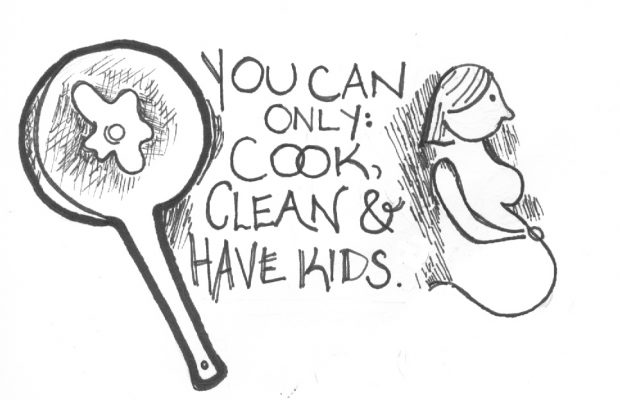Discrimination is not a joke

A few weeks ago, my physical education class was watching a movie, in which the conventionally attractive teenage girl took off her shirt to go for a swim. Cue the obnoxious, uncalled for comments and whistling from primarily the 30+ boys in the room.
I listened to the comments build up off of each other, until I heard one in specific, piercing through the air, from beside me that was particularly rattling: “There is only one gender. Women are property.”
At the very least, I would have hoped the rest of the boys who had originally begun this train of remarks would recognize that it had gone way too far. But they, with full knowledge of this, continued to laugh about it, even going as far as to give their support to the original speaker, emboldening him. The only justification was that it was “just a joke.”
This is ridiculous. A joke is meant to be something humorous said harmlessly, not throw someone or a group of people under the bus for the entertainment of others. There is a line that many people fail to recognize, and this ignorance costs the social progress of many marginalized groups.
A study from West Carolina University found that “People who enjoy sexist jokes show higher tolerance for sexist events, tend to accept rape myths, and tend to show greater willingness to discriminate against women.” The study found the same correlation also applies to racist “jokes.” Essentially, these remarks normalize sexism and racism.
Even if something is not meant to be taken as offensive, “you don’t need to subscribe to doctrines of racial superiority or incite racial violence to say or do something with racist implications. We shouldn’t forget about those who are on the receiving end of discrimination. Harm can occur even if conduct isn’t motivated by hate or malice,” says the Australian Human Rights Commission.
People need to realize that their so-called jokes have consequences. Regardless of what they “meant” by it, it doesn’t erase the harm it causes. Discrimination is just as much about impact as it is about intention.
When you are about to make a joke about female objectification, keeping women in the kitchen, lack of education within a race, racial stereotypes, police brutality or about heightened levels of domestic violence and rape, just think to yourself: what is so funny about this?
